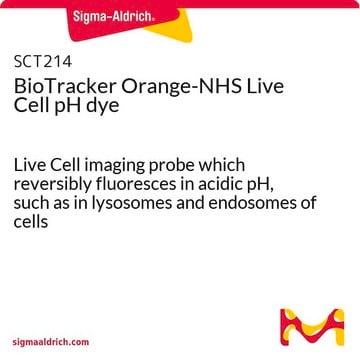SCT044
BioTracker LYSO-TP Live Cell Dye
Live cell imaging dye for hypochlorous acid (HOCl) targeted to cellular lysosomes used to detect phagocytosis, inflammation and cellular apoptosis.
Sinónimos:
Live cell imaging probe
Iniciar sesiónpara Ver la Fijación de precios por contrato y de la organización
About This Item
UNSPSC Code:
12352207
NACRES:
NA.47
Productos recomendados
assay
≥98% (H-NMR)
≥98% (HPLC)
≥98% (LC/MS)
≥98% (elemental analysis)
technique(s)
cell based assay: suitable
detection method
fluorometric
shipped in
ambient
General description
Hypochlorous acid (HOCl) is a highly potent reactive oxygen species (ROS) and helps eliminate pathogens in the innate immune system. Mounting evidence indicates that intracellular HOCl plays additional important roles in regulating inflammation and cellular apoptosis. Subcellular detection of HOCL is currently limited due to low concentration, strong oxidization, and short lifespan of the analyte.
The BioTracker LYSO-TP dye is a live cell two-photon green fluorescent turn-on imaging probe for HOCL. The probe targets HOCL specifically in the lysosomes of cells. The probe exhibit fast response times, good selectivity, and high sensitivity towards hypochlorous acid in living cells. Acedan was chosen as the fluorescence reporting group due to its excellent photophysical properties resulting from the typical push−pull (amineketone) structure. Reaction of the probe with HOCl, which deprotects the oxathiolane/mercaptal group to reveal the ketone, would lead to fluorescence enhancement. To monitor subcellular HOCL levels, morpholine was introduced at a long distance from the reaction site to ensure the probes intracellular localization.
Spectral Properties
Absorbance: 375nm
Emission: 500nm
The BioTracker LYSO-TP dye is a live cell two-photon green fluorescent turn-on imaging probe for HOCL. The probe targets HOCL specifically in the lysosomes of cells. The probe exhibit fast response times, good selectivity, and high sensitivity towards hypochlorous acid in living cells. Acedan was chosen as the fluorescence reporting group due to its excellent photophysical properties resulting from the typical push−pull (amineketone) structure. Reaction of the probe with HOCl, which deprotects the oxathiolane/mercaptal group to reveal the ketone, would lead to fluorescence enhancement. To monitor subcellular HOCL levels, morpholine was introduced at a long distance from the reaction site to ensure the probes intracellular localization.
Spectral Properties
Absorbance: 375nm
Emission: 500nm
Application
Live cell fluorescent imaging
Research Category
Cell Imaging
Cell Imaging
Research Sub Category
Live Cell Dye
Live Cell Dye
Quality
Purity: ≥ 98% confirmed by HNMR, LC-MS and HPLC and elemental analysis
Molar Mass: 357.49 g/mol
Molar Mass: 357.49 g/mol
Physical form
Lyophilized
Storage and Stability
Store BioTracker LYSO-TP Live Cell Dye at -20°C, desiccate and protect from light
Note: Centrifuge vial briefly to collect contents at bottom of vial before opening.
Note: Centrifuge vial briefly to collect contents at bottom of vial before opening.
Disclaimer
Unless otherwise stated in our catalog or other company documentation accompanying the product(s), our products are intended for research use only and are not to be used for any other purpose, which includes but is not limited to, unauthorized commercial uses, in vitro diagnostic uses, ex vivo or in vivo therapeutic uses or any type of consumption or application to humans or animals.
Storage Class
11 - Combustible Solids
wgk_germany
WGK 3
flash_point_f
Not applicable
flash_point_c
Not applicable
Certificados de análisis (COA)
Busque Certificados de análisis (COA) introduciendo el número de lote del producto. Los números de lote se encuentran en la etiqueta del producto después de las palabras «Lot» o «Batch»
¿Ya tiene este producto?
Encuentre la documentación para los productos que ha comprado recientemente en la Biblioteca de documentos.
Los clientes también vieron
Lin Yuan et al.
Journal of the American Chemical Society, 137(18), 5930-5938 (2015-04-24)
Hypochlorous acid (HOCl), as a highly potent oxidant, is well-known as a key "killer" for pathogens in the innate immune system. Recently, mounting evidence indicates that intracellular HOCl plays additional important roles in regulating inflammation and cellular apoptosis. However, the
Nuestro equipo de científicos tiene experiencia en todas las áreas de investigación: Ciencias de la vida, Ciencia de los materiales, Síntesis química, Cromatografía, Analítica y muchas otras.
Póngase en contacto con el Servicio técnico













